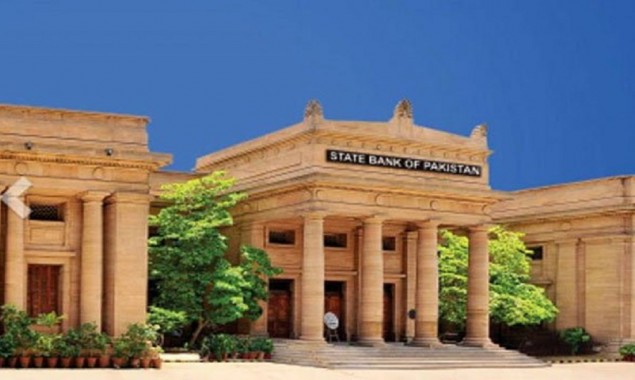State Bank to receive IMF loan worth $2.77 billion on August 23: Tarin
ISLAMABAD: The central bank will receive the International Monetary Fund’s (IMF) unconditional...

State Bank of Pakistan. Image: File
KARACHI: The State Bank of Pakistan (SBP) on Monday introduced an innovative initiative to improve access to finance for the Small and Medium Enterprises (SMEs) in collaboration with the federal government with the aim of enabling businesses who cannot offer security/collateral to access bank finance, a statement said on Monday.
The central bank said this initiative has been brand named, “SME Asaan Finance” or SAAF to emphasise the SME facilitation feature of this scheme and to provide clean lending, i.e., without collateral to the SMEs.
SAAF is a refinance and credit guarantee facility, which has been developed through a wide-ranging consultative process and is aimed at assisting the SMEs that are creditworthy but are still unable to access finance, as they cannot offer the security required as collateral by the banks.
The SBP will provide refinance to the banks, while the government of Pakistan will support via partial credit guarantees to the participating banks.
This support is being provided initially for three years to facilitate investments by the banks in technology, infrastructure and team building specialised in the SME lending, after which the SME financing by the banks is expected to be sustainable without the central bank or the government support.
Speaking about the collateral-free lending scheme, Finance and Revenue Minister Shaukat Tarin said: “The MOF [Ministry of Finance] welcomes and supports this innovative initiative of the State Bank, which would enable [the] SMEs to access bank finance without collateral. We look forward to seeing strong participation from commercial banks to take this initiative forward.”
The SME sector plays a pivotal role in Pakistan’s economy and is estimated by the Small and Medium Enterprises Development Authority (Smeda) to contribute 40 per cent to GDP and 25 per cent in export earnings.
However, despite this the SMEs find it difficult to access formal bank finance, as the SME financing stood at Rs444 billion as of March 31, 2021, which is only 6.6 per cent of the total private sector credit.
This is due to several reasons, including relatively higher loan losses, high costs bank finance models, low usage of appropriate technology needed for the SME finance and the lack of acceptable security.
The SMEs; therefore, often turn to exorbitantly expensive informal credit and face impediments to growth. The majority of the SMEs in the informal sector that do not have collaterals are currently borrowing in cash or kind at the rates of at least 25 per cent. This scheme is primarily targeted to such SMEs.
To overcome these challenges, the State Bank has adopted a fresh and innovative approach to address both the SMEs and the bank issues. The central bank will provide refinancing only to those banks that desire to specialise in lending to the SME sector.
Interested banks will be selected through a transparent bidding process to offer concessionary refinance facilities, which would also carry partial risk coverage from the government of Pakistan.
The banks winning through this bidding process will need to invest in human resources, technology and processes to successfully develop expertise and capability to attract the SME finance market. To participate in SAAF, interested banks will submit expressions of interest (EoIs) to the SBP to build their SME loan portfolio during the three-year validity period of the scheme.
The banks offering the largest portfolio size and the highest number of borrowers will be selected for participation.
The State Bank will encourage the banks that partner with Fintechs to provide an opportunity to innovative financing techniques in a cost-effective manner.
Under the scheme, the central bank will provide refinance for three years to the selected banks. After three years, the refinance will be repaid by the banks in 10 equal yearly installments.
The selected banks will get refinance from the SBP at 1 per cent per annum and extend financing to the SMEs at the end-user rate of up to 9 per cent per annum, which is very attractive, compared with informal finance costs.
Under SAAF, all the SMEs that are new borrowers of a bank will be eligible to avail financing of up to Rs10 million. The collateral-free (clean) financing will be available to the SMEs for long-term fixed capital investment and working capital finance requirements.
The Shariah-compliant Islamic modes of finance, as well as conventional will be offered. The scheme will be available to the SME borrowers towards the end of September, 2021.
An attractive feature of the scheme is that the government of Pakistan will provide risk coverage of 40 per cent to 60 per cent to the selected banks against the losses, depending on the size of the loans.
This risk cover will be 60 per cent for small loans up to Rs4 million; 50 per cent for midsize loans from over Rs4 million to Rs7 million and 40 per cent for relatively large loans of Rs7 million to Rs10 million.
It is expected that this initiative will enable sustainable growth in SME finance, as it aims at addressing the core issues facing this important sector.
Catch all the Business News, Breaking News Event and Latest News Updates on The BOL News
Download The BOL News App to get the Daily News Update & Follow us on Google News.